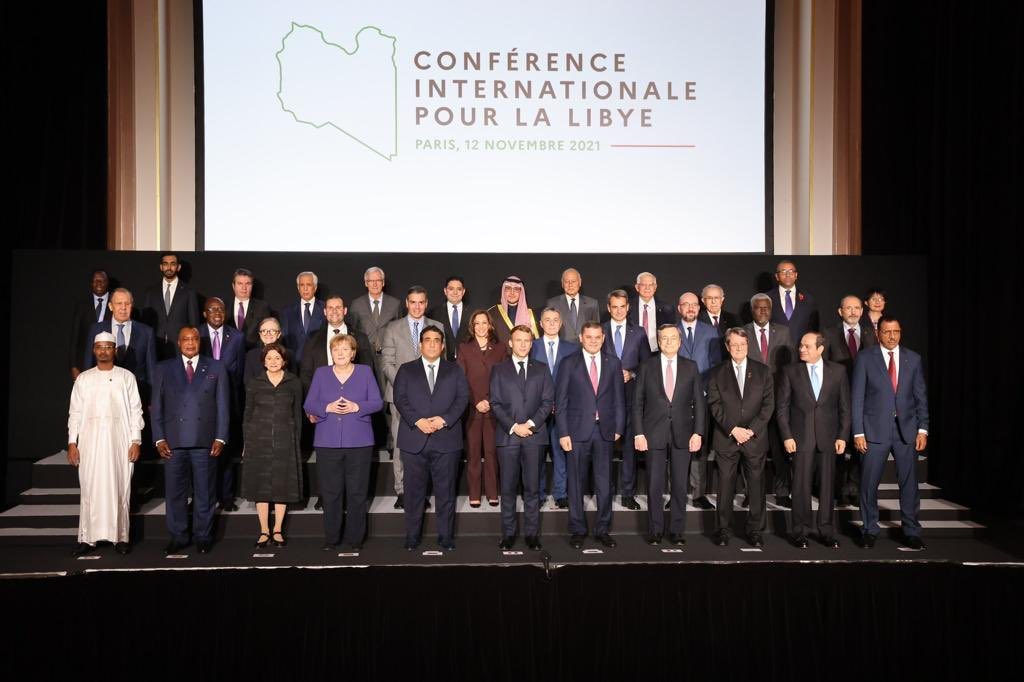Presidential elections are scheduled to take place in the conflict-ridden country on 24 December, with Doha calling for more support to be given to the political process.
Qatar participated at the Paris International Conference for Libya hosted in the French capital on Friday ahead of next year’s expected presidential elections.
Doha was represented by Minister of State for Foreign Affairs Sultan bin Saad Al Muraikhi at the conference—held under the chairmanship of France, Italy and Germany, and in cooperation with the United Nations.
US Vice President Kamala Harris and Egyptian President Abdel Fattah El-Sisi, as well as outgoing German Chancellor Angela Merkel were also in attendance. Meanwhile Libya was presented by head of the presidential council Mohammad Younes Menfi and Prime Minister Abdul Hamid Dbeibah
During his speech, Al Muraikhi said that Qatar is sparing no effort in supporting the aspirations of the Libyan people in achieving “security, stability and prosperity” and the election process.
The Qatari diplomat noted that reaching a sustainable settlement in Libya “requires that all Libyans work to maintain the positive steps achieved over the past period”.
Qatar attends international Libya conference ahead of much-awaited elections
“He added that it also requires strengthening security stability, maintaining the ceasefire with a 5+5 Libyan Joint Military Commission, guaranteeing the implementation of a road map that was a result of the Libyan political dialogue forum in Tunisia,” read a statement by Qatar’s foreign ministry [MOFA].
Furthermore, Al Muraikhi called on the international community to maintain Libya’s sovereignty and independence while supporting the interim Government of National Unity [GNA] amid economic and financial challenges the country is currently facing.
The GNA came into office after years of instability following the overthrow of former dictator Muammar Gaddafi – one of the region’s leaders who faced widespread protests during the 2011 Arab Spring.
Its formation came following a UN-brokered ceasefire, paving the way for presidential elections scheduled to take place on 24 December.
On Sunday, Saif al-Islam al-Gaddafi, accused of gross human rights abuses and son of the former leader, registered as a presidential candidate.
Foreign intervention
In a joint statement, participating countries at the event reiterated their commitment to the success of the political process while rejecting “all foreign interference in Libyan affairs”, calling for the withdrawal of mercenaries and foreign forces from the country.
“This is only a start, Turkey and Russia must withdraw without delay their mercenaries,” French President Emmanuel Macron said.
Turkish President Recep Tayyip Erdogan’s top foreign policy adviser Ibrahim Kalin told the AFP on Saturday that prioritising a rapid troop withdrawal was “wrong”.
“If you single out the pulling out of foreign forces … from Libya, as the most important, as the top issue, we believe that is wrong,” Kalin said.
Libya and Egypt receive Qatari ambassadors after years-long hiatus
“Libya needs support for its political process, the elections, economic issues,” added Kalin.
A UN report from last year said that an estimated 20,000 foreign fighters and mercenaries had arrived in Libya over the past years from countries including Russia, Syria, Turkey, Sudan, and Chad.
Regional and international powers including the UAE, France and Russia have pumped funds and offered support to counter revolutionary forces in Libya in a bid to vie for power through warlord General Khalifa Haftar.
Turkey has been leading a military intervention in the second Libyan civil war, which began in January last year after signing a maritime memorandum with the GNA.
Ankara aimed to put an end to attacks conducted by eastern Libya’s rebel commander Haftar’s coalition. One of its key outcomes was successfully forcing Haftar’s brigades out of northwestern Libya.
Sanctions
The participants at the Paris conference also said that it will sanction those who “obstruct” or “manipulate” the electoral process.
“We affirm that individuals or entities, inside or outside of Libya, who might attempt to obstruct, undermine, manipulate or falsify the electoral process and the political transition” could face sanctions, the statement said.
Human Rights Watch [HRW] had questioned Libyan authorities’ ability to hold free and fair elections amid restrictive laws and the presence of armed groups.
“The main questions leaders at the summit should ask are: can Libyan authorities ensure an environment free of coercion, discrimination, and intimidation of voters, candidates, and political parties?” said HRW in a statement on Thursday.
While presidential elections are set for this year, legislative polls have been delayed amid a split between two rival administrations—Libya’s eastern-based army and its Tripoli-based government, both backed by foreign forces.
Italian Prime Minister Mario Draghi called on rival factions to agree on a new electoral law for the votes to take place as planned.
“The Libyans want to vote…but there needs to be an electoral law, which is fundamental to holding an election,” Draghi told a news conference following the conference on Friday.
“Therefore I hope that this electoral law is drawn up with the agreement of everyone and that everyone gets together, not in the coming weeks, but in the coming days, because it is urgent if you are going to hold elections on Dec. 24,” he added.
Follow Doha News on Twitter, Instagram, Facebook and Youtube







